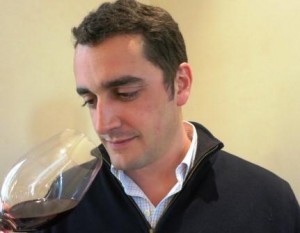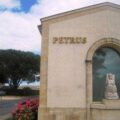2011 Petrus From 100% Merlot, the wine reached 13.5% alcohol. Floral, boysenberry, peppermint, truffle, cocoa, coffee, spice and kirsch. Soft, pure red cherry with refined tannins and a plush, silky, long finish. Lacking the depth and concentration found in 2009 or 2010, there is ample acidity, structure, freshness, balance, length and a strong sense of purity. 95-96 Pts
Jeff Leve “How did you deal with the tannin levels with 2011 Petrus?”
Olivier Berrouet “You’re right. We have higher tannin levels in 2011 Petrus than we did in 2010 or 2009. But due to our soft extraction, the tannins are not aggressive and the wine feels soft.”
Jeff Leve “When do you decide it’s time to harvest in Pomerol?”
Olivier Berrouet “Harvesting is always based on the taste of berries. We focus on taste when we decide to pick. It’s never based on the tannins or polyphenols.”
Jeff Leve “Once you’ve decided the fruit is ripe, how long do you wait to pick?”
Olivier Berrouet “We move quickly. With Merlot, you have a short picking window. Merlot needs to be picked when it’s ripe. If not, the fruit will begin to degrade quickly.”
Jeff Leve “What was the growing season like for you with regards to 2011 Petrus?”
Olivier Berrouet “At Petrus in Pomerol, we experienced a dry, warm spring until July. That helped us get high tannins and the polyphenols we wanted.”
Jeff Leve “So what happened?”
Olivier Berrouet “The problem with 2011 Bordeaux Petrus was the lack of sunshine. We were 150 hours short in terms of sunlight. The lack of sun did not allow the fruit to obtain the same level of ripeness and alcohol we achieved in 2009 and 2010.”
Jeff Leve “What did you get from the growing season and 2011 Petrus that you really liked?”
Olivier Berrouet “We have a huge potential of tannin and structure that allowed us to produce a very good Bordeaux wine in a classic style.”
Jeff Leve “What was your biggest concern during the vinification?”
Olivier Berrouet “Fear of over-extraction. 2011 Petrus required sensitivity during the process. We had to make sure we did not get too many unripe tannins. So we were soft and careful, and made sure the cap was kept moist.”
Jeff Leve This was not like 2009 or 2010, was it?
Olivier Berrouet With a laugh and a smile, he said, “In 2009 and 2010 you had to work hard to make bad wine. It was quite the opposite in 2009. 2011 Bordeaux is a winemakers vintage!”
Jeff Leve “How is your construction coming along?”
Olivier Berrouet “Our new facilities will be finished in time for the 2012 Bordeaux vintage!”
Jeff Leve “What are some of the changes you’re making at Petrus?”
Olivier Berrouet “We’ll have a new vat room for starters.”
Jeff Leve “How will this differ from your current vat rooms?”
Olivier Berrouet “We will still maintain the same type of traditional, square, concrete vats. But we’ll have much more control during fermentation as we’ll have a total of 12 new vats ranging from 50 hectoliters, up to 130 hectoliters.”
Jeff Leve “With 12 new vats, does that correspond to the number of parcels in the vineyards?”
Olivier Berrouet “We have 14 blocks in total at Petrus.”
Jeff Leve “Within those 14 parcels, what is the average age of your vines?”
Olivier Berrouet “On average, at Petrus, our vines are about 40 years old. However our oldest block was planted in 1952.”
Jeff Leve “How often do you replant at Petrus?”
Olivier Berrouet “Our program at Petrus is to replant one hectare every 7-9 years. However, at some point, when a block becomes too old, the entire block must be replanted. That makes it easier to work the vines and retain homogenous character at Petrus.”



